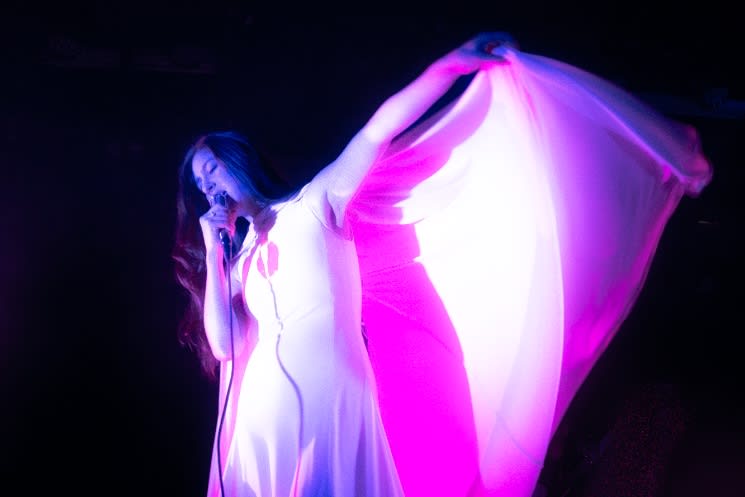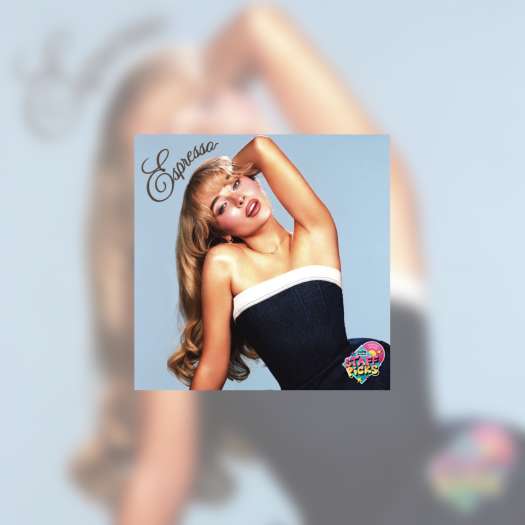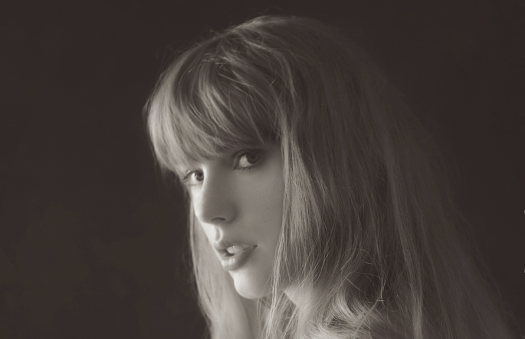If Natalie Mering's lyrics were printed in a book, it'd be the kind publishers and critics would extol as "essential reading," a timely treatise to guide us through our current moment. Mering's work as Weyes Blood — her last two albums, 2019's Titanic Rising and 2022's And in The Darkness, Hearts Aglow, are the first two instalments in a trilogy that excavates individual and societal responses to climate disaster and social upheaval — has evolved enormously in ambition and scope over the last decade, speaking to the here and now with unflinching honesty and immense beauty. "[Titanic Rising] was an observation of things to come, the feelings of impending doom," Mering explained last year in a note to her fans. "And in the Darkness, Hearts Aglow is about entering the next phase, the one in which we all find ourselves today — we are literally in the thick of it."

That "we" is crucial. On Tuesday evening, Mering opened her set at Vancouver's Commodore Ballroom with Hearts Aglow single "It's Not Just Me, It's Everybody." As the title rung through the venue, it resonated as both a comment on our collective fears and as a nod to the very act of performing; though Mering was elevated on a stage (the recipient of great critical acclaim and the possessor of an astounding gift for songcraft), this show was not just about her — it was about everybody.
That message was reinforced each time she sang a song that addressed a collective "we," which is by no means a rarity in her catalogue. After "It's Not Just Me, It's Everybody" Mering grabbed her acoustic guitar for "Children of the Empire," one of her sun-soaked, Laurel Canyon-invoking tunes that tucks apocalyptic warnings into playful constructions. "We don't have time anymore," she sang on the chorus, taking a quick pause before her voice rose again to specify that what we don't have time for is "to be afraid."
For her third song, Mering broke away from Hearts Aglow to perform Titanic Rising's "A Lot's Gonna Change," remarking on its theme by informing the sold-out crowd that the last time she played Vancouver, it was in a parking garage. "I think a lot has, y'know, changed since then, too," she said with a comedian's knack for inflection, momentarily shrouding her face with her flowing white cape.

The cape became a significant prop when she moved into "God Turn Me into a Flower," for which she commissioned visuals from English documentary filmmaker Adam Curtis. Projected onto a curtain that remained otherwise blank throughout the set was a montage of disjointed clips that flickered by at varying speeds.
At first, they lingered long enough to get a general sense of what they were: a man writhing on a bed, a glimmer of ecstasy on his face while others attempt to pin his limbs down; a woman on the floor, contracting into a fetal position; hazy footage of Mering spinning in a dress that cut to a Barbie doll doing the same. Meanwhile, on stage, Mering was turning too, transcending human form as she swayed in front of an empyrean light that beamed from the back of the stage. Her cape glowed yellow, and when the footage of "sublime violence" started flashing faster behind her, she remained moored by patient harmonies.
The mood lightened after that excursion. She played chipper Titanic Rising cuts like "Andromeda," "Wild Time" and "Everyday" — hopping on the keys for the latter — interspersed with Hearts Aglow's more romance-focused ballads: "Grapevine," "A Given Thing," and the slinking, synthetic "Twin Flame," during which her chest was lit up by the same fiery heart on her album's cover. Things slowed down again for "Movies," Titanic Rising's spiritual companion to "God Turn Me into a Flower," and again Mering was converted by light into another substance — this time vanishing into a silhouette of blue waves. She didn't dip further back in her discography than her two latest albums, but considering the sonic and thematic cohesion she's so far established in her planned three-part series, it was a wise choice.

Before performing "Grapevine," Mering reflected on how, when touring, she used to ask audiences whether they believed in the 1969 moon landing. (She recalled Canadians being much more skeptical about it than Americans.) For this tour, she decided to pose a new question: "Who, here, believes in astrology?" The cheers from the believers and non-believers were roughly the same volume, and Mering let those poll results linger a bit before sharing, simply, that she thinks astrology is "almost true."
The first song of Mering's encore was "Something to Believe," and she prefaced the performance by describing it as "the thesis" of the set, everything wrapped in one. On the chorus, she pleaded, "Give me something I can see / Something bigger and louder than the voices in me." Evidently, she understands the impulse toward something as big and "almost true" as astrology, but Mering's music asks us to keep searching for something truer. It might lie somewhere in the grainy, lurid images that flashed in Curtis's montage, or it might be in the faces of strangers on the street or the great openness of the night sky. The challenge is to not turn away when it gets dizzying, but to find the glow within.

That "we" is crucial. On Tuesday evening, Mering opened her set at Vancouver's Commodore Ballroom with Hearts Aglow single "It's Not Just Me, It's Everybody." As the title rung through the venue, it resonated as both a comment on our collective fears and as a nod to the very act of performing; though Mering was elevated on a stage (the recipient of great critical acclaim and the possessor of an astounding gift for songcraft), this show was not just about her — it was about everybody.
That message was reinforced each time she sang a song that addressed a collective "we," which is by no means a rarity in her catalogue. After "It's Not Just Me, It's Everybody" Mering grabbed her acoustic guitar for "Children of the Empire," one of her sun-soaked, Laurel Canyon-invoking tunes that tucks apocalyptic warnings into playful constructions. "We don't have time anymore," she sang on the chorus, taking a quick pause before her voice rose again to specify that what we don't have time for is "to be afraid."
For her third song, Mering broke away from Hearts Aglow to perform Titanic Rising's "A Lot's Gonna Change," remarking on its theme by informing the sold-out crowd that the last time she played Vancouver, it was in a parking garage. "I think a lot has, y'know, changed since then, too," she said with a comedian's knack for inflection, momentarily shrouding her face with her flowing white cape.

The cape became a significant prop when she moved into "God Turn Me into a Flower," for which she commissioned visuals from English documentary filmmaker Adam Curtis. Projected onto a curtain that remained otherwise blank throughout the set was a montage of disjointed clips that flickered by at varying speeds.
At first, they lingered long enough to get a general sense of what they were: a man writhing on a bed, a glimmer of ecstasy on his face while others attempt to pin his limbs down; a woman on the floor, contracting into a fetal position; hazy footage of Mering spinning in a dress that cut to a Barbie doll doing the same. Meanwhile, on stage, Mering was turning too, transcending human form as she swayed in front of an empyrean light that beamed from the back of the stage. Her cape glowed yellow, and when the footage of "sublime violence" started flashing faster behind her, she remained moored by patient harmonies.
The mood lightened after that excursion. She played chipper Titanic Rising cuts like "Andromeda," "Wild Time" and "Everyday" — hopping on the keys for the latter — interspersed with Hearts Aglow's more romance-focused ballads: "Grapevine," "A Given Thing," and the slinking, synthetic "Twin Flame," during which her chest was lit up by the same fiery heart on her album's cover. Things slowed down again for "Movies," Titanic Rising's spiritual companion to "God Turn Me into a Flower," and again Mering was converted by light into another substance — this time vanishing into a silhouette of blue waves. She didn't dip further back in her discography than her two latest albums, but considering the sonic and thematic cohesion she's so far established in her planned three-part series, it was a wise choice.

Before performing "Grapevine," Mering reflected on how, when touring, she used to ask audiences whether they believed in the 1969 moon landing. (She recalled Canadians being much more skeptical about it than Americans.) For this tour, she decided to pose a new question: "Who, here, believes in astrology?" The cheers from the believers and non-believers were roughly the same volume, and Mering let those poll results linger a bit before sharing, simply, that she thinks astrology is "almost true."
The first song of Mering's encore was "Something to Believe," and she prefaced the performance by describing it as "the thesis" of the set, everything wrapped in one. On the chorus, she pleaded, "Give me something I can see / Something bigger and louder than the voices in me." Evidently, she understands the impulse toward something as big and "almost true" as astrology, but Mering's music asks us to keep searching for something truer. It might lie somewhere in the grainy, lurid images that flashed in Curtis's montage, or it might be in the faces of strangers on the street or the great openness of the night sky. The challenge is to not turn away when it gets dizzying, but to find the glow within.




